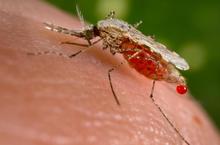Health officials say a yearling filly has died of Eastern equine encephalitis virus near Ocala, Florida. Since April 22, the local health department has issued four notices of positive tests for the mosquito-borne illness and warns that the threat of more cases still exists as long as mosquitoes are present in the area.

Mosquito getting its blood meal
The Eastern equine encephalitis virus attacks the central nervous system and unvaccinated horses are very susceptible to the infection with infected horses often dying within three days.
© 2014 by US GOV CDC
The horse first showed signs of illness in June and died this week. Test results confirmed that the filly died of the virus.
EEE virus attacks the central nervous system and unvaccinated horses are very susceptible to the infection. The disease appears within five days after a mosquito transmits the virus to the horse. Onset of clinical symptoms are abrupt and infected horses often die within three days.
EEE occurs in a wide variety of songbirds, including the blue jay, chickadee, cardinal, tufted titmouse and catbird. Mosquitoes that inhabit marshes and wooded wetlands, named Culiseta melanura,transmit the virus from bird to bird and also to horses and people.
During years of outbreaks, mosquito species other than Culiseta melanura become involved in the transmission cycle. EEE cases in horses usually begin to appear in mid- to late-summer and increase in the fall.
The virus can also affect humans and health officials are warning residents to take precautions to avoid being bitten by mosquitoes. In humans the virus may cause fever, muscle aches, headaches and seizures
